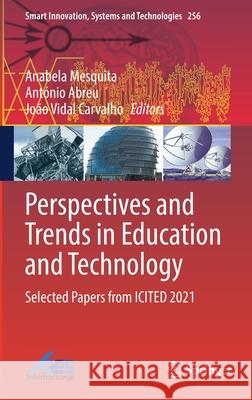Perspectives and Trends in Education and Technology: Selected Papers from Icited 2021 » książka



Perspectives and Trends in Education and Technology: Selected Papers from Icited 2021
ISBN-13: 9789811650628 / Angielski / Twarda / 2021 / 680 str.
Perspectives and Trends in Education and Technology: Selected Papers from Icited 2021
ISBN-13: 9789811650628 / Angielski / Twarda / 2021 / 680 str.
(netto: 958,46 VAT: 5%)
Najniższa cena z 30 dni: 963,86
ok. 22 dni roboczych.
Darmowa dostawa!
Qualitative-Naturalistic Research Route. A Meta-analytical Alternative for Management Studies: Work Satisfaction in Factories.- Cybersecurity in Smart Cities - Technology and Data Security in Intelligent Transport Systems.- Youth Associations in Academia: Their Implications for the Creation and Development of an Entrepreneurial Profile.- Modular Educational Ecosystem as Academic Support During Covid-19 Emergency at Mexico City-IPN in 2020.- The Incidence of Abuse and School Harassment Among Foreign and Spanish Students in Extremadura.- Tití App, An Interactive Psycho-Pedagogical Recovery Tool: A Pilot Study.- Accessibility and Usability in Learning Objects.- Museum, School and Augmented Reality a Way to Pre-serve the Ethno Identity of an Ancestral Culture.- Multinomial Logistic Regression Model for Prioritization of COVID-19 Vaccination in Portoviejo – Ecuador.- Visual Metrics for Educational Videogames Linked to Socially Assistive Robots in an Inclusive Education Framework.
This book presents high-quality, peer-reviewed papers from the International Conference in Information Technology & Education (ICITED 2021), to be held at the ESPM – Higher School of Advertising and Marketing, Sao Paulo, Brazil, between the 15th and the 17th of July 2021. The book covers a specific field of knowledge. This intends to cover not only two fields of knowledge – Education and Technology – but also the interaction among them and the impact/result in the job market and organizations. It covers the research and pedagogic component of Education and Information Technologies but also the connection with society, addressing the three pillars of higher education. The book addresses impact of pandemic on education and use of technology in education. Finally, it also encourages companies to present their professional cases which is discussed. These can constitute real examples of how companies are overcoming their challenges with the uncertainty of the market.
1997-2026 DolnySlask.com Agencja Internetowa
KrainaKsiazek.PL - Księgarnia Internetowa









